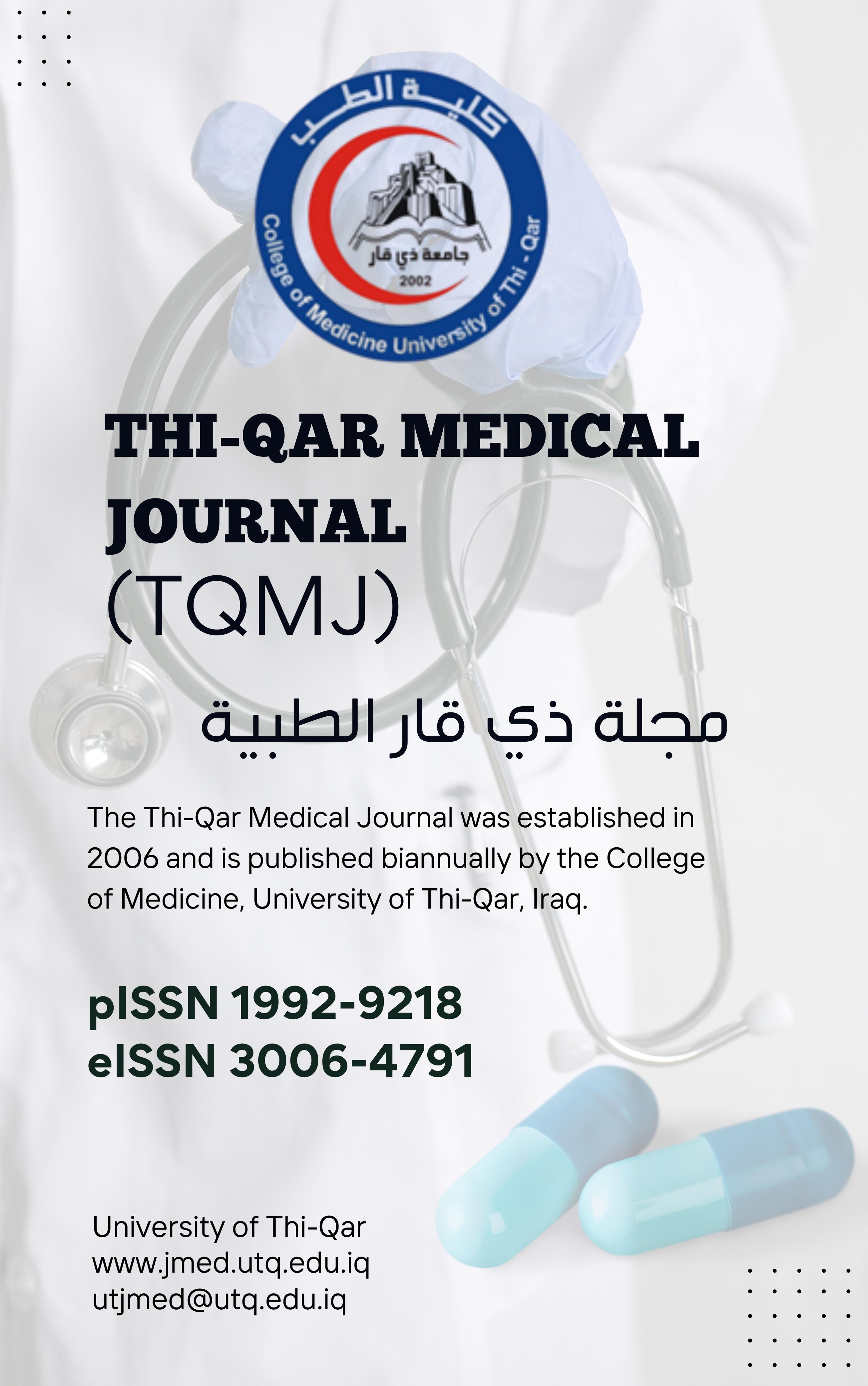Alogliptin Alleviates Ischemia/ Reperfusion Induced Kidney Injury by Attenuating Inflammation and Apoptosis in Rats Model
DOI:
https://doi.org/10.32792/tmj.v28i2.608Keywords:
Alogliptin, ischemia/reperfusion, urea, creatinine, Kim-1Abstract
Ischemia/reperfusion injury is a complicated phenomenon leading to cellular damage via thebiphasic process. Ischemia causes injury by reducing or entirely eliminating the energy supply required
for homeostasis. Reperfusion exacerbates cellular damage through several proposed mechanisms,
including inflammatory responses and the production of free radicals and oxygen. A total of 24 adult male
rats were randomly divided into four groups(n=6). Sham group: Rats were anesthetized and had a
surgery without ischemia-reperfusion induction. I/R control group: Rats underwent a same anesthetic
procedure, followed by 40 min bilateral renal ischemia, then 2 hr. of reperfusion. DMSO group: Rats
were received DMSO (as a solvent for alogliptin) ip injection at 24hr and 30 min. before surgery (an
identical surgical technique as the control group). Alogliptin treated group: Rats were received
alogliptin ip injection 10 mg/kg at 24h and 30 min. before surgery (an identical surgical technique as the
control group). All rats had their blood samples and renal tissues collected the conclusion of the
reperfusion phase. In blood samples, serum urea and creatinine were measured by the standard laboratory
protocols, and by using ELISA method, KIM-1 measurement was taken in kidney tissues. Furthermore,
kidney histopathological investigation was conducted by assessing the extent of degeneration, tubular
dilation, interstitial lymphocyte infiltration, and loss of brush borders. It was concluded that kidney
damage resulted from elevated urea, creatinine, and KIM-1 levels noted in blood samples and kidney
tissues of rats in both control and DMSO groups in contrast with sham group. In comparison to the
control and DMSO groups, rats in the treatment group showed decreasing levels of urea, creatinine, and
KIM-1, Furthermore, the treated group with alogliptin also had decreased histopathological damage
scores. these results suggest that alogliptin can prevent kidney damage as mainly evidenced by the
decreased histopathological damage region, enhanced renal functions. Alogliptin's characteristics may
facilitate its application in the management of acute kidney injury (AKI).
References
KALOGERIS, T., BAINES, C. P., KRENZ, M. & KORTHUIS, R. J. 2012. Cell biology of
ischemia/reperfusion injury. Int Rev Cell Mol Biol, 298, 229-317.
OLIVEIRA, T. H. C., MARQUES, P. E., PROOST, P. & TEIXEIRA, M. M. M. 2018.
Neutrophils: a cornerstone of liver ischemia and reperfusion injury. Lab Invest, 98, 51-62.
CHIANG, C. K., LOH, J. Z., YANG, T. H., HUANG, K. T., WU, C. T., GUAN, S. S., LIU, S.
H. & HUNG, K. Y. 2020. Prevention of acute kidney injury by low intensity pulsed
ultrasound via anti-inflammation and anti-apoptosis. Sci Rep, 10, 14317.
GOWDA, S., DESAI, P. B., KULKARNI, S. S., HULL, V. V., MATH, A. A. & VERNEKAR,
S. N. J. N. A. J. O. M. S. 2010. Markers of renal function tests. 2, 170.
ISMAIL, O. Z., ZHANG, X., WEI, J., HAIG, A., DENKER, B. M., SURI, R. S., SENER, A. &
GUNARATNAM, L. 2015. Kidney injury molecule-1 protects against Galpha12
activation and tissue damage in renal ischemia-reperfusion injury. Am J Pathol, 185,
-15.
WANG, M., WENG, X., CHEN, H., CHEN, Z. & LIU, X. J. A. C. B. 2020. Resveratrol inhibits
TNF-α-induced inflammation to protect against renal ischemia/reperfusion injury in
diabetic rats. Acta Cirurgica Brasileira, 35, e202000506.
COVINGTON, P., CHRISTOPHER, R., DAVENPORT, M., FLECK, P., MEKKI, Q. A.,
WANN, E. R. & KARIM, A. J. C. T. 2008. Pharmacokinetic, pharmacodynamic, and
tolerability profiles of the dipeptidyl peptidase-4 inhibitor alogliptin: a randomized,
double-blind, placebo-controlled, multiple-dose study in adult patients with type 2
diabetes. Clinical therapeutics, 30, 499-512.
TORRES-GONZÁLEZ, L.,CIENFUEGOS-PECINA, E., PERALES-QUINTANA, M. M.,
ALARCON-GALVAN, G., MUÑOZ-ESPINOSA, L. E., PÉREZ-RODRÍGUEZ, E.,
CORDERO-PÉREZ, P. J. O. M. & LONGEVITY, C. 2018. Nephroprotective effect of
Sonchus oleraceus extract against kidney injury induced by ischemia‐reperfusion in
wistar rats. Oxidative medicine and cellular longevity, 2018, 9572803.
HERRERA-LUNA, Y., LOZANO, M., PASTEN, C., MULTHOFF, G. & IRARRAZABAL, C.
E. 2022. The Ischemia and Reperfusion Injury Involves the Toll-Like Receptor-4
Participation Mainly in the Kidney Cortex. Cell Physiol Biochem, 56, 613-628.
Najah R. Hadi, Fadhil AL-amran, Thu-Alfeqar R. Tweij, Mohammed E. Mansur. CDDO Me
Provides Kidney Protective Impacts Against Ischemia/Reperfusion Injury via Inhibition
Thi-Qar Medical Journal (TQMJ): Vol. (28), No. (2), 2024
Web Site: https://jmed.utq.edu
Email: utjmed@utq.edu.iq
ISSN (Print):1992-9218 ISSN (Online): 3006-4791
of Oxidative Stress and Inflammation by Targeting Nrf2 and NF-kB Signaling Pathways.
Systematic Reviews in Pharmacy. 2020;11(1):108-118.
SALVATORE, T., PAFUNDI, P. C., MARFELLA, R., SARDU, C., RINALDI, L., MONACO,
L., RICOZZI, C., IMBRIANI, S., NEVOLA, R., ADINOLFI, L. E. & SASSO, F. C.
Metformin lactic acidosis: Should we still be afraid? Diabetes Research and
Clinical Practice, 157.
Wei, Q., Bhatt, K., He, H.-Z., Mi, Q.-S., Haase, V. H., & Dong, Z. (2010). Targeted deletion of
Dicer
from proximal tubules protects against renal ischemia-reperfusion injury. Journal
of the American Society of Nephrology, 21(5), 756-761.
LASORSA, F., RUTIGLIANO, M., MILELLA, M., D’AMATI, A., CROCETTO, F.,
PANDOLFO, S. D., BARONE, B., FERRO, M., SPILOTROS, M., BATTAGLIA, M.,
DITONNO, P. & LUCARELLI, G. 2024. Ischemia–Reperfusion Injury in Kidney
Transplantation: Mechanisms and Potential Therapeutic Targets. International Journal of
Molecular Sciences, 25, 4332.
HAN, B. H., LEE, H. K., JANG, S. H., TAI, A. L., JANG, Y. J., YOON, J. J., KIM, H. Y., LEE,
H. S., LEE, Y. J. & KANG, D. G. 2021. Effect of Geumgwe-Sinkihwan on Renal
Dysfunction in Ischemia/Reperfusion-Induced Acute Renal Failure Mice. Nutrients, 13.
SAKR, S. & KAMEL, M. 2023. Effect of Alogliptin and L-carnitine on Nephrotoxicity
Inducedby Gentamicin in Rats. Zagazig Veterinary Journal, 51, 45-58.
BOTROS, S. R., MATOUK, A. I., AMIN, A. & HEEBA, G. H. 2024. Comparative effects of
incretin-based therapy on doxorubicin-induced nephrotoxicity in rats: the role of
SIRT1/Nrf2/NF-kappaB/TNF-alpha signaling pathways. Front Pharmacol, 15, 1353029.
Downloads
Published
Issue
Section
License
Copyright (c) 2025 University of Thi-Qar Journal Of Medicine

This work is licensed under a Creative Commons Attribution-NonCommercial-NoDerivatives 4.0 International License.




